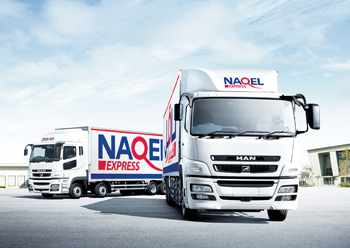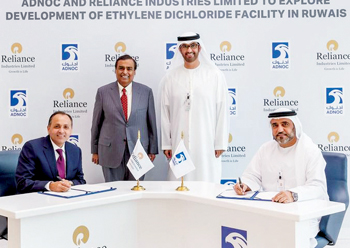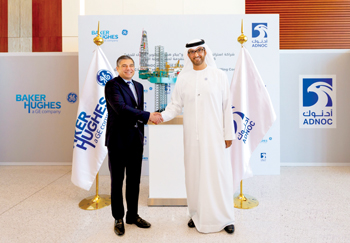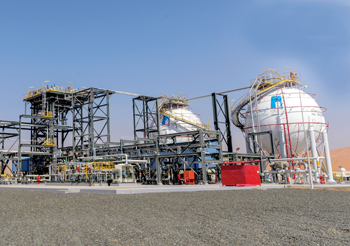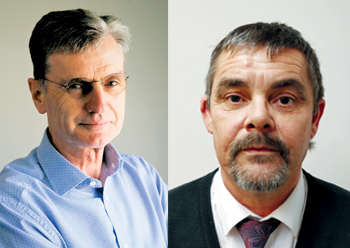
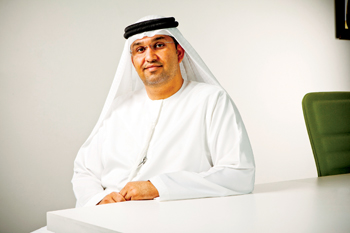 Al Jaber ... leading Adnoc to success
Al Jaber ... leading Adnoc to success
The 2030 growth strategy, built on strategic foundations – People, Performance, Profitability and Efficiency – will transform the way Adnoc maximises value from every barrel
Abu Dhabi National Oil Company (Adnoc), the UAE’s national oil company, may have outlined an overtly ambitious growth strategy. However, business in the past year shows a determined oil giant on the course for success.
 |
Adnoc has opened its concessions to new strategic partners |
Laid out in 2018, the company’s 2030 comprehensive, multipronged game plan shows strong emphasis on transformation and delivery, value creation plans, and greater downstream investment, in addition to an integrated gas strategy, which is part of Abu Dhabi’s move towards energy self-sustainability.
“Adnoc’s integrated 2030 strategy is to transform the way we maximise value from every barrel, to deliver the greatest possible return to Abu Dhabi as we help meet the world’s growing demand for energy,” says a company spokesman.
Last year, at its second investor forum in Abu Dhabi, Adnoc enlightened an influential global audience of its 2030 smart growth strategy and a pipeline of new partnership and co-investment opportunities across its value chain on its path to building an integrated global energy leader of the future.
The forum highlighted Adnoc’s track record of successful partnerships and co-investments over the past 45 years, underpinned by its world-scale hydrocarbon resource and asset base, and its resilience over industry cycles, reported UAE’s national news agency, WAM.
 |
Adnoc and KNOC officials at the first oil discovery from the Al Haliba field |
Adnoc provided an update of its marketing, supply and trading strategy across three core areas of shipping, storage and trading. Earlier 2019, Adnoc launched two new trading units in ADGM. Adnoc Global Trading, Adnoc’s trading joint venture with Eni and OMV, which will focus on trading refined products from Adnoc Refining, and AdnocTrading, which will trade crude oil.
At the forum, Dr Sultan Ahmed Al Jaber, UAE Minister of State and Adnoc Group CEO, said: “Over the last two years, we have developed a substantial pipeline of attractive and innovative partnership and co-investment opportunities, covering both equity and debt, and including opportunities in our infrastructure portfolio, service and support businesses, as well as our key operating business.”
He said Adnoc was actively seeking long-term, value-adding partners to invest and grow alongside us.
As part of its new value creation strategy in support of its 2030 strategy, Adnoc opened its concessions to new strategic partners and competitively tendered new exploration blocks. The company also for the first time entered the global capital and debt markets with the issuance of a $3 billion bond on its ADCOP pipeline asset and executed the first ever IPO of an Adnoc business with the successful listing of Adnoc Distribution on the ADX.
Furthermore, Adnoc last year closed a landmark oil pipeline infrastructure investment with BlackRock, KKR, Abu Dhabi Pensions Fund and Singapore’s sovereign wealth fund, GIC, resulting in nearly $5 billion of foreign direct investment into Abu Dhabi and the UAE.
The state oil company was on track to raise its oil production capacity to 4 million barrels per day (mpbpd) by 2020 and 5 mbpd by 2030.
In July last year, Adnoc started production oil from Abu Dhabi’s Haliba oil field in addition to discovering potential resources in three new fields in its concession area.
The project was undertaken by Al Dhafra Petroleum, a joint venture between Adnoc, Korea National Oil Company (KNOC) and GS Energy, and one of Adnoc’s youngest operating companies.
Located along the southeast border of Abu Dhabi, Haliba field is a building block of Adnoc’s oil production capacity growth. The company said the initial production from the field would progressively increase to 40,000 bpd by 2019-end.
Al Dhafra Petroleum had embarked on an extensive appraisal programme in Haliba field leading to the discovery of 1.1 billion barrels of original oil in place (OOIP), a significant increase from the 180 million initially estimated. At the same time, it discovered potential resources in three new fields – Al Humrah, Bu Tasah, and Bu Nikhelah – following intensive exploration programmes.
It was the first time Al Dhafra Petroleum had started producing crude since it was established in 2014.
Separately, Adnoc announced a significant investment to upgrade its giant Bab onshore field, one of its largest onshore producing assets, located 160 km southwest of Abu Dhabi city. The investment will re-energise Adnoc’s first field producing Murban grade crude to sustain long-term crude oil production capacity and reinforces Adnoc’s commitment to maximising value from Abu Dhabi’s hydrocarbon resources.
The investment is valued at $489 million, through an engineering, procurement and construction (EPC) contract that will achieve in-country value in excess of 75 per cent, underscoring Adnoc’s drive to enabling sustainable value for the UAE and supporting the growth and diversification of the nation’s economy.
Adnoc Onshore, a subsidiary of Adnoc and the operator of the field, awarded a 39-month EPC contract to Archirodon Construction Overseas (Archirodon) to build the facilities and infrastructure required to sustain long-term crude oil production capacity of the field at 485,000 bpd.
According to Abdulmunim Saif Al Kindy, Executive Director of Adnoc’s Upstream Directorate: “The award follows an extremely competitive and rigorous tender process that ensures that over 75 per cent of the award value will flow into the UAE’s economy, stimulating local economic growth and nurturing new business opportunities for the private sector, in line with the leadership’s wise directives. The Bab field is integral to our strategy to create a more profitable upstream business and this award will ensure that we sustain long-term oil production capacity from a maturing field, underlining our commitment to making smart investments and engaging value-add partners to unlock and maximize value from Abu Dhabi’s vast hydrocarbon resources.”
The scope of the Bab field upgrade project includes the development of oil producing wells, water injection wells, artificial lift wells, well-bays, let down stations, water injection clusters and other infrastructure required to sustain the production capacity of the field.
To support Adnoc’s upstream growth plans, its subsidiary Adnoc Drilling has undertaken a major rig fleet expansion programme.
In Phase 1 of the programme, Adnoc acquired four technologically advanced and UAE-built land rigs with a total value of over $100 million in November 2019. Following the integration of the four rigs, which will join the fleet in the Q1 2020, Adnoc Drilling plans to acquire dozens of additional land, offshore, and island rigs by 2025.
Al Kindy says: “This major rig expansion programme cements Adnoc Drilling’s position as the largest drilling company in the Middle East and the region’s first fully integrated drilling services (IDS) company and will support Adnoc’s target to achieve a crude oil production capacity of 5 million barrels per day by 2030.”
According to Abdalla Saeed Al Suwaidi, CEO of Adnoc Drilling, the company’s rig fleet has expanded more than three-fold in less than a decade, from 29 rigs in 2010 to the current 95 rigs.
Adnoc Drilling will remain the sole rig provider to the Adnoc Group and capitalise on Adnoc’s growing upstream activity.
Part of the upstream growth are integrated drilling services. Adnoc Drilling late last year completed its first fully IDS well in the Al Dabbyia onshore field, Al Dhafra Region.
Adnoc plans to grow its conventional drilling activity by 40 per cent by 2025 and substantially ramp up the number of its unconventional wells.
GLOBAL GROWTH STRATEGY
Adnoc is exploring international growth opportunities outside home as well. Last year, it signed a broad framework agreement with China’s Rongsheng Petrochemical Company that will see both companies explore opportunities in the sale of refined products from Adnoc to Rongsheng, downstream investment opportunities in both China and the UAE, and the supply and delivery of liquified Natural Gas, LNG, to Rongsheng.
Under the terms of the Framework Agreement, Adnoc and Rongsheng will explore opportunities for increasing the volume and variety of refined products sales to Rongsheng as well as Adnoc’s active participation as Rongsheng’s strategic partner in refinery and petrochemical opportunities, including an investment in Rongsheng’s downstream complex.
In return, Rongsheng will also explore potential investments in Adnoc’s downstream industrial ecosystem in Ruwais, including the proposed Gasoline Aromatics Plant, GAP, and the potential for Adnoc to supply and deliver LNG for utilisation by Rongsheng within its production complexes in China.
Another framework agreement signed was with the Federal State Budgetary Organisation, Russian Energy Agency (REA) by the Ministry of Energy of the Russian Federation, REA, to explore new opportunities for collaboration across the oil and gas value chain.
Under the terms of the agreement, Adnoc and REA will jointly explore opportunities for collaboration in relation to Abu Dhabi’s exploration and production concessions.
The two partners will jointly assess strategic opportunities for collaboration in the downstream sector, including refining and petrochemicals opportunities in Abu Dhabi and internationally.
Adnoc is developing its global marketing, supply, and trading platforms to better optimise and commercialise its assets and product flows to deliver greater value from its operations. In August, it acquired a 10 per cent equity stake in VTTI BV, the global storage terminal owner and operator, providing it with better access to customers around the world and enabling it to respond more quickly to market dynamics while capturing trading value throughout its entire supply chain.
To increase its global presence, Abu Dhabi’s Supreme Petroleum Council in November last year announced it would implement a new pricing mechanism for Adnoc’s Murban crude. As a result, Murban pricing will move from a retroactive official selling price to market-driven, forward pricing using a Murban futures contract as its price marker.
Leading operator of global exchanges and clearing houses Intercontinental Exchange announced the launch of a new exchange, ICE Futures Abu Dhabi (IFAD) to host the world’s first futures contracts based on Murban crude oil.











































































